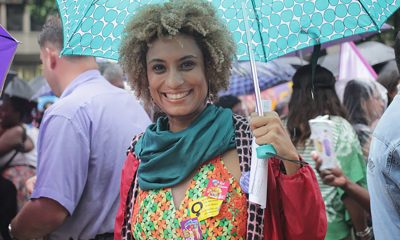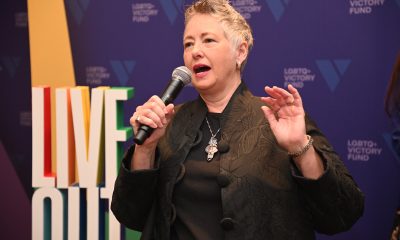South America
Brazilian LGBTQ lawmakers threatened during conference
VoteLGBT organized Brasília gathering
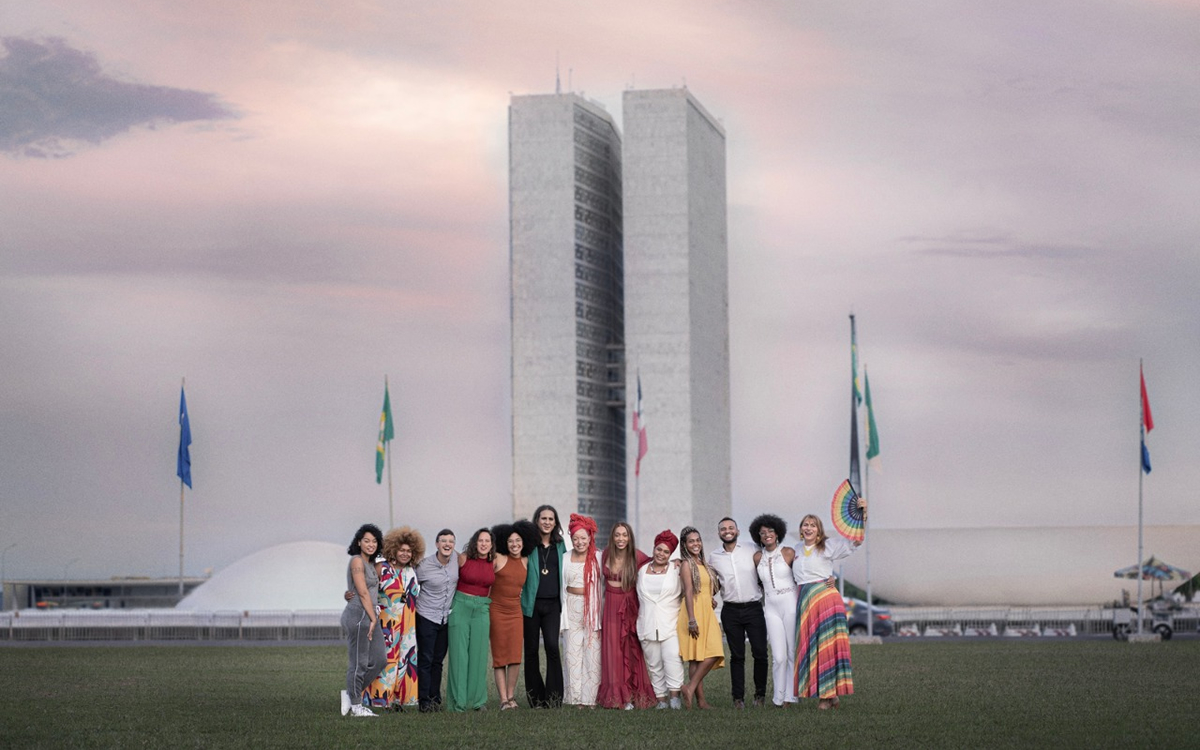
The LGBTQ Victory Institute on Tuesday condemned the threat that Brazilian lawmakers received during a conference in which it participated in the country’s capital.
A press release notes São Paulo Legislative Assemblywoman-elect Thainara Faria, a Black bisexual woman who is a member of President Luiz Inácio Lula da Silva’s Workers’ Party, on Jan. 20 “received a threatening, racist and LGBT-phobic email that indicated that they physical integrity of the representatives-elect at our event was at risk.”
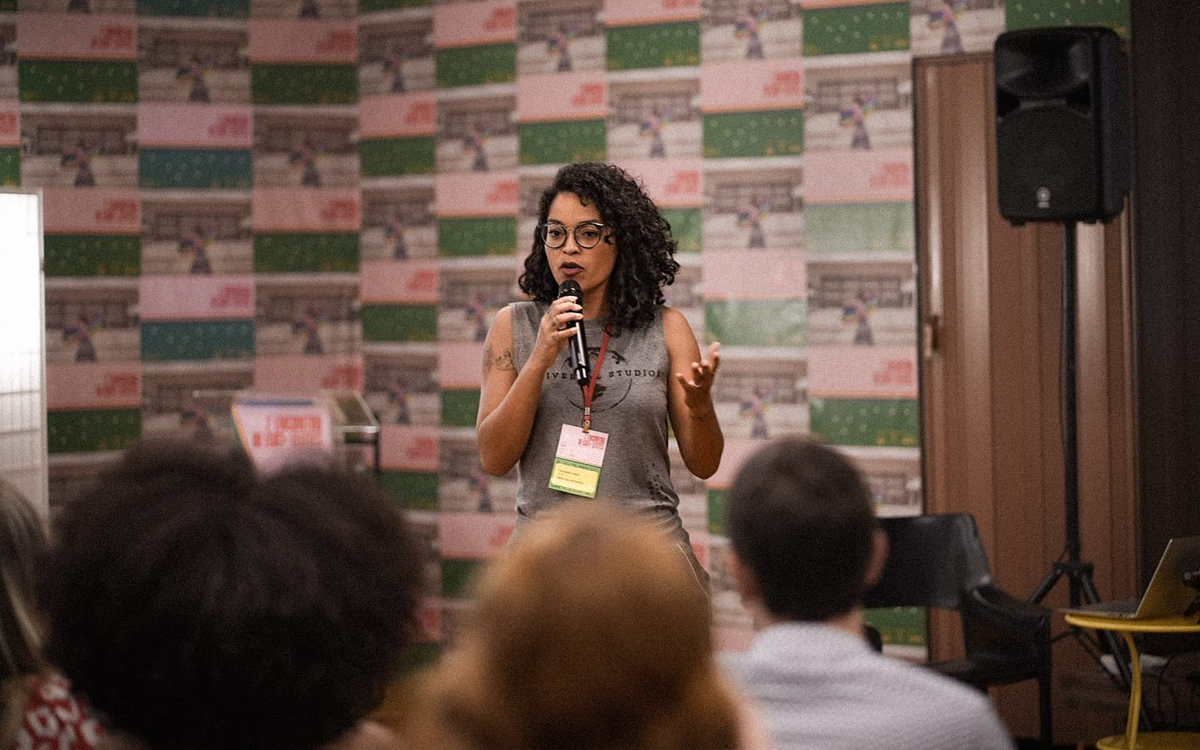
Faria is one of the 18 openly LGBTQ congressional and state legislative candidates who won election last October. She, along with transgender Congresswomen Erika Hilton and Duda Salabert and 11 of the other elected officials, attended the first-of-its-kind conference that took place in Brasília.
The Victory Institute notes VoteLGBT, the main organizer that seeks to increase the number of LGBTQ and intersex people in Brazilian politics, reached out to Fábio Félix, a gay member of the Socialism and Liberty Party who is a member of the Federal District’s Legislative Chamber, and Congresswoman Erika Kokay, a member of the Workers Party who represents the Federal District, after Faria received the threat. Félix and Kokay then contacted local authorities who provided conference participants with a police escort.
Officers patrolled the conference venue, and organizers increased private security. The Victory Institute also notes two Brazilian government ministries — the Human Rights and Citizenship Ministry and the Justice and Public Safety Ministries — have begun to investigate the threat.
The Equal Rights in Action Fund co-organized the conference along with VotoLGBT and the Victory Institute. Associaçao Nacional de Travestis e Transexuais (National Association of Travestis and Transsexuals), a Brazilian trans rights group known by the acronym ANTRA, and Associação Brasileira de Lésbicas, Gays, Bissexuais, Travestis, Transexuais e Intersexos (Brazilian Association of Lesbians, Gays, Bisexuals, Travestis, Transsexuals and Intersex People) are among the other groups that sponsored the gathering.
Faria, along with the other elected officials who attended the conference and the groups that organized and sponsored it, in a joint statement said “fascism uses terror in an attempt to paralyze and weaken our fight.”
“They attack us because of our project is powerful,” it reads. “We understand that the best response to this attack — in addition to quickly protecting the threatened representative, reinforcing the security at the event and contacting the competent authorities — is to continue with our agenda and scheduled programming.”
The conference took place less than two weeks after thousands of former President Jair Bolsonaro supporters stormed the Brazilian Congress, Supreme Court and presidential palace.
Bolsonaro, a member of the right-wing Liberal Party, sought to discredit the country’s electoral system ahead of last October’s presidential election. Da Silva defeated him in the second round, but Bolsonaro never publicly acknowledged he lost. Bolsonaro flew to Florida two days before Da Silva’s inauguation, which took place on Jan. 1.
Both Hilton and Salabert received threats during their respective campaigns.
Hilton, a Black travesti and former sex worker who was a member of the São Paulo Municipal Council before she won her seat in Congress, acknowledged concerns about her safety when she spoke with the Washington Blade shortly after her election. A security guard stood a few feet away from her while she spoke with this reporter at a pro-Da Silva rally in São Paulo’s Praça Roosevelt.
“I am afraid, but I think that this fear is not going to be able to stop me,” Hilton told the Blade. “It is the fuel that motivates me.”
Former Congressman Jean Wyllys, who is openly gay and a vocal Bolsonaro critic, in 2019 resigned and fled the country after he received death threats.
Rio de Janeiro Municipal Councilwoman Marielle Franco, a bisexual woman and single mother of African descent who grew up in a favela near the city’s international airport, and her driver, Anderson Gomes, were murdered on March 14, 2018. Bolsonaro was not president at the time, but one of the two former police officers who have been arrested and charged with the murders lived in the same condominium complex in Rio’s exclusive Barra da Tijuca neighborhood in which the now former president lives. Franco’s widow, Rio Municipal Councilwoman Mônica Benício, last March described this fact to the Blade as “just a coincidence.”
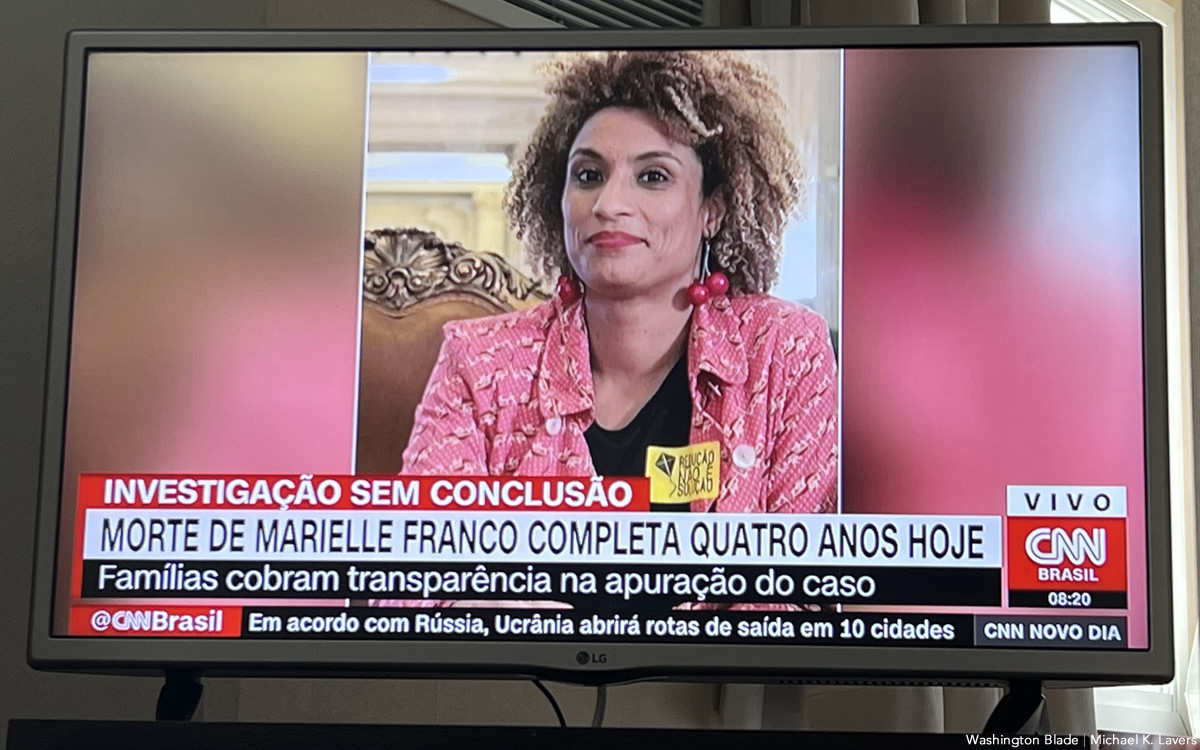
‘We will continue fighting for a democracy for all’
The joint statement that Hilton and the other conference participants signed states the threats against them is “a good example of how political violence works, seeking to silence our voices.”
“Despite the sabotage of many different actors, including some in their own parties, LGBT+ candidates received more than 3.5 million votes in 2022,” it reads. “Traditional politics needs our voices, because we do not advocate for LGBT+ issues alone; we propose innovative public policies to fight hunger, lack of housing, discrimination and all of the evils plaguing our people.”
“LGBT+ political strategies will continue to flourish in all spaces, despite threats to any elected representative,” adds the statement. “Attacks will be met with investigations and accountability. United and strong, we will continue fighting for a democracy for all.”
South America
Argentina government dismisses transgender public sector employees
Country’s Trans Labor Quota Law enacted in 2021

Protests have broken out across Argentina in recent weeks after the dismissal of transgender people from their government jobs.
President Javier Milei’s action is in stark contract with the progress seen in 2023, where the government’s hiring of trans people increased by 900 percent within the framework of the Trans Labor Quota Law that had been in place since 2021.
Among those affected is Sofia Diaz, a “survivor” who shared her testimony with the Washington Blade hours after she traveled from Chaco Province to Buenos Aires to protest her dismissal.
Presentes, an LGBTQ news agency, reported the government dismissed more than 85 trans employees in less than two weeks.
Diaz, 49, holds a degree in combined arts. She joined the National Social Security Administration (ANSES) in 2022 under the Trans Labor Inclusion Law. The layoffs began in January and left many people feeling uncertain and anguished. It was her turn a few days ago.
Diaz in an interview recounted how the situation became progressively more complicated, with difficulties in accessing information about her employment status and the eventual confirmation of dismissals through WhatsApp messages. This government action, according to Diaz, violates the law.
“We were on a Friday, I think on March 24, in the office and we have a WhatsApp group of other colleagues from all over Argentina who entered through the trans labor quota and they tell us if we can get our pay stubs on the intranet,” Diaz recalled. “So, I tried to enter, I could not, I talked to two other colleagues and they told me no, they could not, and so we went to another person. He couldn’t either.”
“Some people told us that it could be a system error. Well, we were never calm, let’s say not how this issue of installing fear and the perversion with which they do it ends,” she added. “This sadism of … inflicting pain and speculating with your misfortune and so on … is something that characterizes Javier Milei’s government.”
Diaz recalled a list of those dismissed from the agency began to circulate from the union in the afternoon. A colleague passed it on to her, “and well, unfortunately I was also on that list.”
“At that moment the whole weekend went by with anguish, crying, and talking with other colleagues from other places, not only trans, but everyone, everyone and everyone,” she said. “On Monday when we went to try to enter, we could not enter with the biometric, which is the thumb we had to use every morning to enter.”
Despite the difficult moment through which she is going, the trans activist stressed to the Blade that she will continue protesting and will even sue the government because her dismissal is illegal and “violates the constitution itself.”
The LGBTQ community and its allies have mobilized and organized demonstrations, highlighting the importance of defending the rights won and fighting against discrimination and exclusion. Diaz emphasized the fight is not only for the people affected today, but also for future generations, saying the historical memory of the struggles for inclusion and social justice must be kept alive.
“The Argentine government thus faces a key challenge in human and labor rights, where public pressure and social mobilization can play a determining role in protecting the rights of LGBTQ+ people,” Diaz said.
South America
Daniel Zamudio murderer’s parole request denied
Raúl López Fuentes convicted of murdering gay man in Chilean capital in 2012
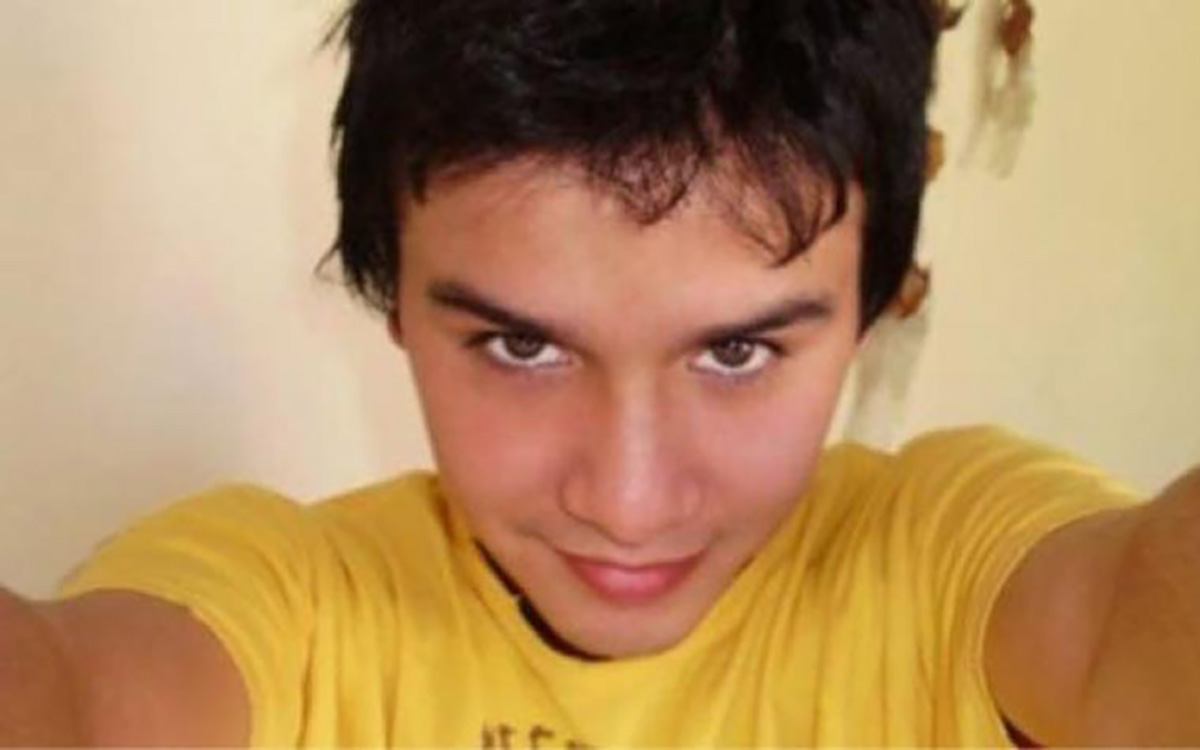
Chile’s Parole Commission on Tuesday rejected a request to allow one of the four men convicted of murdering Daniel Zamudio in 2012 to serve the remainder of his sentence outside of prison.
Raúl López Fuentes earlier this month asked the commission to release him on parole. Zamudio’s family and members of the Movement for Homosexual Integration and Liberation, a Chilean LGBTQ rights group, had gone to court to block the request.
Among the arguments put forward that influenced the commission’s decision is what Movilh categorized as his “high risk of recidivism, linked to the adherence of an antisocial behavior with a tendency to minimize his acts transgressing social norms.”
The commission pointed out that López has psychopathic traits because he is aware of the damage he did to Zamudio and his family.
“In addition, he maintains a high risk of violence, not being advisable to grant the benefit,” the report said.
Zamudio was a young Chilean man who became a symbol of the fight against homophobic violence in his country and around the world after López and three other young men with alleged ties to a neo-Nazi group beat him for several hours in Santiago’s San Borja Park on March 2, 2012. Zamudio succumbed to his injuries a few weeks later.
The attack sparked widespread outage in Chile and prompted a debate over homophobia in the country that highlighted the absence of an anti-discrimination law. Lawmakers in the months after Zamudio’s murder passed a law that bears Zamudio’s name.
López in 2013 received a 15-year prison sentence after he was convicted of killing Zamudio. Patricio Ahumada received a life sentence, while Alejandro Angulo Tapia is serving 15 years in prison. Fabían Mora Mora received a 7-year prison sentence.
Zamudio’s mother, Jacqueline Vera, exclusively told the Washington Blade after the commission rejected López’s request that “we as a family are calmer.”
“Even with my husband we were in a lot of pain at the beginning. It was like a blow of very strong emotions, so we tried to stay calm because we still had to solve the problem,” Vera said. “We had four days to solve it.”
López will have to serve the remaining three years of his sentence before his release.
“I will continue working to improve the Zamudio Law and so that this murderer does not leave prison because he is a danger to society, he does not represent repentance and people like this cannot be free,” she said. “For the same reason, we have to work so that hate crimes have life imprisonment and that is what we will concentrate on.”
South America
Man convicted of killing Daniel Zamudio in Chile seeks parole
Raúl López Fuentes in 2013 sentenced to 15 years in prison

One of the four men convicted of murdering a young gay man in the Chilean capital in 2012 is seeking parole.
Raúl López Fuentes in 2013 received a 15-year prison sentence after he was convicted of killing Daniel Zamudio.
Zamudio was a young Chilean man who became a symbol of the fight against homophobic violence in his country and around the world after López and three other young men with alleged ties to a neo-Nazi group beat him for several hours in Santiago’s San Borja Park on March 2, 2012. Zamudio succumbed to his injuries a few weeks later.
The attack sparked widespread outage in Chile and prompted a debate over homophobia in the country that highlighted the absence of an anti-discrimination law. Lawmakers in the months after Zamudio’s murder passed a law that bears Zamudio’s name.
Patricio Ahumada received a life sentence, while López and Alejandro Angulo Tapia are serving 15 years in prison. Fabían Mora Mora received a 7-year prison sentence.
López has asked the Seventh Santiago Guarantee Court to serve the last three years of his sentence on parole. Zamudio’s family and Jaime Silva, their lawyer who works with the Movement for Homosexual Integration and Liberation, oppose the request.
Movilh represented Zamudio’s family after his murder.
Zamudio’s mother, Jacqueline Vera, during an exclusive interview with the Washington Blade said López’s petition “provoked all the anguish, all the commotion of his time.”
“It was very cruel because in fact two days before we were at Daniel’s grave, where it was 12 years since his death and the beating,” said Vera. “He really does not deserve it.”
“We have gone through very difficult moments,” she added.
The mother, who later created a foundation to eradicate discrimination in Chile, was emphatic in indicating that she and her family “do not accept the release of this guy because he is a danger to society and a danger to ourselves.”
“At the last hearing where they were sentenced, they told us that we are going to remember them when they get out,” said Vera. “They threatened us with death. There is a video circulating on social networks where they were in front of me and they laughed and made fun of me. They told me that I remembered that I had three more children.”
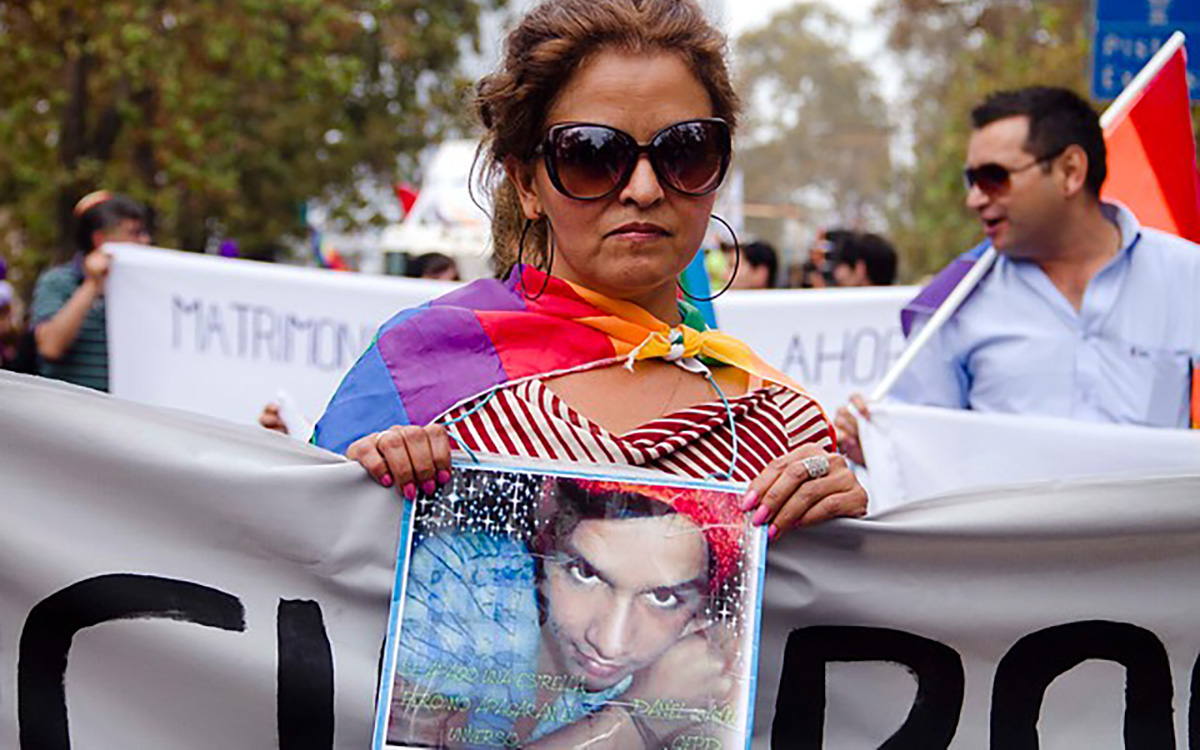
Regarding the possibility that the Chilean justice system will allow López to serve the remaining three years of his sentence on parole, Vera said “with the benefits here in Chile, which is like a revolving door where murderers come and go, it can happen.”
“In any case, I don’t pretend, I don’t accept and I don’t want (López) to get out, I don’t want (López) to get out there,” she said. “We are fighting for him not to get out there because I don’t want him to get out there. And for me it is not like that, they have to serve the sentence as it stands.”
LGBTQ Chileans have secured additional rights since the Zamudio Law took effect. These include marriage equality and protections for transgender people. Advocacy groups, however, maintain lawmakers should improve the Zamudio Law.
“We are advocating for it to be a firmer law, with more strength and more condemnation,” said Vera.
When asked by the Washington Blade about what she would like to see improved, she indicated “the law should be for all these criminals with life imprisonment.”
-

 State Department4 days ago
State Department4 days agoState Department releases annual human rights report
-

 District of Columbia3 days ago
District of Columbia3 days agoCatching up with the asexuals and aromantics of D.C.
-

 South America2 days ago
South America2 days agoArgentina government dismisses transgender public sector employees
-

 Maine3 days ago
Maine3 days agoMaine governor signs transgender, abortion sanctuary bill into law

